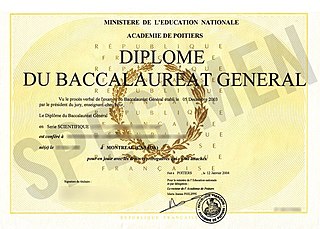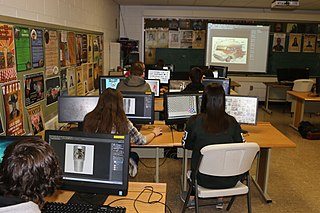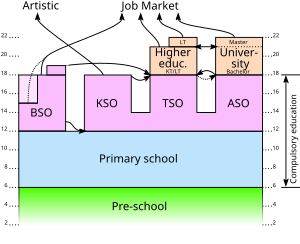
Gymnasium is a term in various European languages for a secondary school that prepares students for higher education at a university. It is comparable to the US English term preparatory high school. Before the 20th century, the gymnasium system was a widespread feature of educational systems throughout many European countries.

Matura or its translated terms is a Latin name for the secondary school exit exam or "maturity diploma" in various European countries centered around the former Austro-Hungarian Empire, including Albania, Austria, Bosnia and Herzegovina, Bulgaria, Croatia, Czech Republic, Hungary, Italy, Kosovo, Liechtenstein, Montenegro, North Macedonia, Poland, Serbia, Slovakia, Slovenia, Switzerland and Ukraine.

The baccalauréat, often known in France colloquially as the bac, is a French national academic qualification that students can obtain at the completion of their secondary education by meeting certain requirements. Though it has only existed in its present form as a school-leaving examination since Emperor Napoleon Bonaparte's implementation on March 17, 1808, its origins date back to the first medieval French universities. According to French law, the baccalaureate is the first academic degree, though it grants the completion of secondary education. Historically, the baccalaureate is administratively supervised by full professors at universities.
An academic term is a portion of an academic year during which an educational institution holds classes. The schedules adopted vary widely. Specific synonyms are commonly used to denote the duration or a term. In most countries, the academic year begins in late summer or early autumn and ends during the following spring or summer.
Seventh grade is the seventh year of formal or compulsory education. The seventh grade is typically the first, second or third year of middle school. In the United States, children in seventh grade are usually around 12–13 years old. Different terms and numbers are used in other parts of the world.
Eighth grade is the eighth year of formal or compulsory education in the United States of America. The eighth grade is second, third, or fourth year of middle school. Students in eighth grade are usually 13-14 years old. Different terms and numbers are used in other parts of the world.
Tenth grade is the tenth year of formal or compulsory education. It is typically the second year of high school. In many parts of the world, students in tenth grade are usually 15 or 16 years of age.

Twelfth grade is the twelfth year of formal or compulsory education. It is typically the final year of secondary school and K–12 in most parts of the world. Students in twelfth grade are usually 17–18 years old. Some countries have a thirteenth grade, while other countries do not have a 12th grade/year at all.

Westview High School is a public high school located in Torrey Highlands, a community of San Diego, California in the United States. It is part of the Poway Unified School District.

Education in Portugal is free and compulsory until the age of 18, when students usually complete their year 12. However, only one of those requirements is necessary. The education is regulated by the State through the Ministry of Education. There is a system of public education and also many private schools at all levels of education. The first Portuguese medieval universities, such as the University of Coimbra, were created in the 13th century, and the national higher education system is fully integrated into the European Higher Education Area.
Education in Romania is based on a free-tuition, egalitarian system. Access to free education is guaranteed by Article 32 in the Constitution of Romania. Education is regulated and enforced by the Ministry of National Education. Each step has its own form of organization and is subject to different laws and directives. Since the downfall of the communist regime, the Romanian educational system has gone through several reforms.

Education in Belgium is regulated and for the most part financed by one of the three communities: Flemish, French and German-speaking. Each community has its own school system, with small differences among them. The federal government plays a very small role: it decides directly the age for mandatory schooling and indirectly the financing of the communities.
The Singapore-Cambridge General Certificate of Education Ordinary Level is a GCE Ordinary Level examination held annually in Singapore and is jointly conducted by the Ministry of Education (MOE), Singapore Examinations and Assessment Board (SEAB) and the University of Cambridge Local Examinations Syndicate (UCLES). Students are graded in the bands ranging from A to F and each band has a respective grade point, a lower grade point indicates better performance. The number at the end of each grade corresponds to the grade point that they receive. To pass an individual O-Level subject, a student must score at least C6 or above. The highest grade a student can attain is A1.
The National Diploma is a diploma given to French pupils at the end of 3e, This diploma is awarded to students who are or were within French cultural influence, including France itself, Morocco, Tunisia, Lebanon, Syria and Algeria, the first two having been french protectorates, while the middle two were under French Mandate after World War I whilst the last was a French territory from 1830 until its independence in 1962. Pupils outside of France who study in French schools belonging to the Agency for French Teaching Abroad network also sit this exam.
The education in the Flemish Community covers the Dutch-speaking part of Belgium and consists of three networks (netten): government-provided education (gemeenschapsonderwijs), subsidized public schools and subsidized free schools.

Education in Moldova is currently the responsibility of the Ministry of Education, Culture and Research.
Education in Jamaica is primarily modeled on the British education system.

Education in Gabon is largely based on the French educational system. On the federal level, it is regulated by two Ministries: the Ministry of Education, which is in charge of Pre-school through to High School, and the Ministry of Higher Education and Innovative Technologies, which is in charge of universities and professional schools.
Colegio Arubano is a secondary school in Aruba that serves students in grades seven through twelve from one of its two campuses in either the capital city of Oranjestad or the southern community of Sint Nicolaas. The two campuses have been separated now, and the school in Sint Nicolaas has become a different school with the new name Colegio Nigel Matthew.
The Junior Cycle is the first stage of the education programme for post-primary education within the Republic of Ireland. It is overseen by the Department of Education and the National Council for Curriculum and Assessment (NCCA), and its terminal examination, the Junior Certificate, by the State Examinations Commission.












